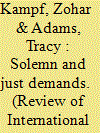| Srl | Item |
| 1 |
ID:
110835


|
|
|
|
|
| Publication |
2012.
|
| Summary/Abstract |
Since the beginning of the 1990s, there has been growing academic interest in the speech act of apology. Both the nature of apologetic communicative processes and the potential of apologies to promote reconciliation remain, however, under debate. The aim of this article is to map common types of rituals found in what is termed 'the age of apology', to identify the processual and structural characteristics of these rituals, and to understand their contribution to restoring relations in the global arena. The analysis yields three types of rituals of apology: purification - that is, asymmetrical rituals in which the offender issues an apology in order to purify his or her dismal past but does not necessarily need the approval of an offended party; humiliation - that is, asymmetrical rituals in which the offended party forces the offender to participate in a degradation ritual as a condition for closure; and settlement - that is, symmetrical rituals in which both sides strive to restore relations. The theoretical and practical implications of these rituals are discussed.
|
|
|
|
|
|
|
|
|
|
|
|
|
|
|
|
| 2 |
ID:
175539


|
|
|
|
|
| Summary/Abstract |
Demands for apology are a prominent rhetorical means for pointing out transgressions in contemporary world politics. They transform ‘seen but unnoticed’ conduct into ‘seen and noticed’ transgression and attach a price tag to the restoration of damaged relations. Nevertheless, compared to the widely discussed practice of apologising, demands for apologies have received scant scholarly attention. In this article we adopt an actor-oriented perspective in order to situate the speech act of demanding an apology within the delicate management of interstate relations. In-depth content analysis of 57 cases of demands made by various state actors in a variety of diplomatic contexts between 1999 and 2019 let us delineate the discursive construction of transgressions, the normative scripts that inform acts of demands, the types of sought-after remedies, and their discursive consequences. We conclude by discussing the normative diplomatic scripts that guide demands for apology and how these speech acts reconfigure power relations in international politics.
|
|
|
|
|
|
|
|
|
|
|
|
|
|
|
|
| 3 |
ID:
181536


|
|
|
|
|
| Summary/Abstract |
International Relations scholars and practitioners commonly agree that relationships in world politics are managed impersonally. Personal connections between agents of states are perceived as having only little impact on foreign policy of states. The current article challenges this impersonal ethos, suggesting that personal relationships play an important role in conducting, and thus understanding, interstate relations. Interviews conducted with 21 senior Israeli officials concerning mundane professional practices reveal three elements that are essential for successful statecraft: acknowledging the power of interpersonal relations; substantive knowledge of counterparts; and the excellent communicative competencies needed to realize the potential of personal connections. We argue that statespersons’ behavior can be located on an impersonal-interpersonal continuum. Furthermore, we suggest explanations for deviations from the impersonal ethos and discuss the role of interpersonal practices in managing interstate relations. At the very least, the personal aspect should be taken into consideration when examining foreign policy. However, personal relations may have a highly significant impact on interstate interactions, thus requiring a revision of the current paradigm in IR, which marginalizes the personal aspect.
|
|
|
|
|
|
|
|
|
|
|
|
|
|
|
|